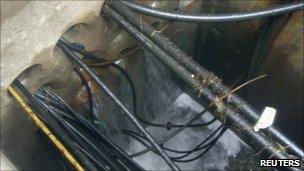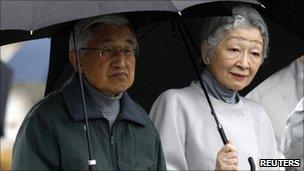Japan crisis: Tepco agrees conditions for state aid
- Published

Tepco says workers stopped a leak into a storage pit outside reactor No 3
The operator of Japan's crisis-hit nuclear plant has agreed to drastic restructuring in return for government help paying a huge compensation bill.
The conditions agreed by Tepco include massive cost-cutting, no upper limit for compensation payouts and accepting an investigation of its management.
The move comes exactly two months after the devastating earthquake and tsunami.
Earlier Tepco said it had found another leak of highly contaminated water into the sea but was able to halt the flow.
A Tepco spokesman said workers stopped a leak into a storage pit, which lay outside reactor No 3 and within metres of the ocean.
A similar leak at the Fukushima Daiichi plant's reactor No 2 was sealed in April with a special chemical known as liquid glass.
The plant has been leaking radiation since the 11 March earthquake and subsequent tsunami damaged cooling systems at the six-reactor plant.
More than 80,000 local residents living within a 20km (12 mile) radius of the plant have been evacuated from their homes.
Agriculture and businesses have been hit and there is no timescale yet for allowing residents to return - Tepco has said that it may take up to nine months to achieve a cold shut-down at the plant.
Tepco is seeking a 2 trillion yen ($24.8bn) loan to see it through the initial emergency. It also expects to pay 50 billion yen ($620m) in initial compensation to those evacuated around the plant.
Overall damages are unknown but are expected to be much higher.
The government is considering establishing a new body to deal with the payments in case they exceed Tepco's ability to pay.
In a statement on Tuesday, the company said it faced "an extremely severe situation" in terms of raising funds and that it needed state help so that "fair and prompt" compensation could be paid to residents.
Lifted spirits
Two months since the twin natural disaster, people across the affected region held a moment of silence for the victims.

Fukushima's mayor said the imperial visit had lifted evacuees' spirits
Nearly 15,000 people are confirmed dead and more than 9,800 remain unaccounted for, according to the latest police figures.
The number of people still living in evacuation centres stands at about 115,000 - mostly in Miyagi, Iwate and Fukushima prefectures.
Earlier on Wednesday Emperor Akihito and his wife visited evacuees living in a gymnasium in Fukushima City.
Fukushima Mayor Takanori Seto said the imperial visit had lifted spirits.
"In reality, evacuees are going through serious pain. They want to go home. But in front of their majesties, they said 'Yes, we are OK.' I was moved by that," the mayor told reporters.
"At evacuation shelters, people are worried because they don't know what will happen to them in the future," he said.
"The nuclear plant has to be stabilised as soon as possible."